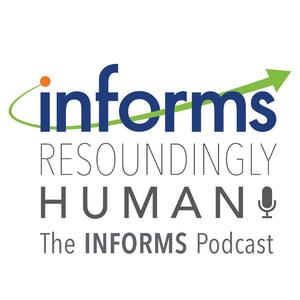Published: March 3, 2021

For more than four decades, winners of the Edelman Award have been recognized for transforming how we approach some of the world’s most complex problems. This year’s finalists are no exception, with revolutionary contributions in robotics, cancer radiotherapy efficiency, unmanned warehouse technology, mining efficiency and the impact to chemical facilities, scheduling and production at manufacturing plants, and food assistance amid emergency responses. Since its inception, finalists for the Edelman Award have contributed to a cumulative impact of over $302 billion, supported lifesaving efforts across the globe, and transformed how the world does business.
Joining me for this episode are Hengle Qin, director of operations research, JD Logistics at JD.com, Linwei Xin, assistant professor of operations management at the Booth School of Business at the University of Chicago, to discuss their team’s finalist entry for the 2021 competition.
A conventional warehouse system heavily relies on human labor. Workers walk along the storage aisles, pick up requested items from storage racks, and return to sort and pack the orders. By contrast, in a modern unmanned warehouse, AGVs pick up storage racks and transport them to workstations, where pickers pick up the items from the racks to fulfill the orders.
Interviewed this episode:

Hengle Qin, Linwei Xin
JD Logistics at JD.com, Booth School of Business at the University of Chicago
Hengle Qin was a senior research scientist at InnoPeak Technology, Inc, in Palo Alto, CA. Before that, I served as a research scientist at JD.com American from Nov 2017 to Jan 2021. I received my Ph.D. degree in Computer Science from Wuhan University, 2017. My interests primarily focus on the field of Computer Vision and Graphics. In particular, I tackle the challenges in 3D reconstruction, RGB-D fusion, depth estimation, image synthesis and visual correspondence. I am also interested in data-driven 3D object analysis, such as geometric scene perception, template-based shape recovery and neural rendering.
Linwei Xin is an assistant professor of Operations Management at the University of Chicago Booth School of Business. His primary research is on inventory and supply chain management: designing models and algorithms for organizations to effectively “match supply to demand” in various contexts with uncertainty. His research using asymptotic analysis to study stochastic inventory theory has been recognized with several INFORMS paper competition awards, including the Applied Probability Society Best Publication Award (2019), First Place in the George E. Nicholson Student Paper Competition (2015), Second Place in the Junior Faculty Interest Group Paper Competition (2015), and a finalist in the Manufacturing and Service Operations Management Student Paper Competition (2014). His work with JD.com on dispatching algorithms for robots in intelligent warehouses was recognized as a finalist for the INFORMS 2021 Franz Edelman Award, with an estimate of billions of dollars in savings. His research motivated by Walmart online grocery’s recommendation-at-checkout-system received the 2017 CSAMSE (Chinese Scholars Association for Management Science and Engineering) Best Paper Award. His research with Argonne National Lab on dynamic line rating received the 2020 IEEE Transactions on Power Systems Best Paper Award. His other honors include winning a National Science Foundation grant as a principal investigator. His research has been published in journals such as Operations Research and Management Science.
Before joining Booth in 2017, Xin was a faculty member at the University of Illinois at Urbana-Champaign where he was on the List of Teachers Ranked as Excellent by Their Students. He also worked for Walmart Labs as a data scientist intern in 2015 and IBM Research as a research intern in 2013.
Xin earned a PhD in operations research from the Georgia Institute of Technology’s H. Milton Stewart School of Industrial and Systems Engineering in 2015 and a bachelor’s degree in mathematics from Zhejiang University in 2008. He also pursued PhD studies in mathematics at Georgia Tech prior to his operations research studies.
Episode Transcript
Contact us to request transcript.
Want to learn more? Check out the additional resources and links listed below for more information about what was discussed in the episode.
Virtual 2021 INFORMS Business Analytics Conference
